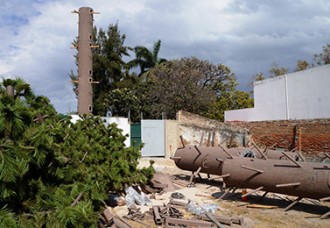Foreigners – perhaps as many as 40, mainly Americans and Canadians – who purchased beachfront land in Tenacatita are outraged by the actions of wealthy Guadalajara businessman Andres Villalobos, who, with the support of dozens of armed Jalisco state police officers, has appropriated their properties, even though many have legal titles held in bank trusts.
Villalobos, who obtained a court order to carry out the eviction of around 50 low-income families, has vowed to demolish every standing structure in a 80-hectare tract of land bordering Tenacatita beach, regardless whether they are legally titled to others. State police and employees of Villalobos’ company, Inmobiliaria Rodenas, have blocked the road to the beach and are keeping everyone off the land.
As of press time, this newspaper has learned that while some palapa beach huts and restaurants may have been torn down, the concrete structures are still standing.
“(Villalobos) intended to demolish the buildings but appears to have suspended the work,” said Guadalajara lawyer Miguel Alfonso Medrano Chavez, who filed an amparo (a court order protecting individual and constitutional rights) on behalf of the local ejido (farm cooperative) last Friday. A foreigner who managed to get close to the beach in a boat this week also confirmed that buildings were still standing.
Medrano, who will file lawsuits on behalf of three foreign landowners this week, said Villalobos’ employees are erecting fencing to keep people out. He said police officers are not respecting the amparo, which legally permits ejido members and the owners of lots and homes to return to their properties.
Foreigners who believed they owned legitimate land in Tenacatita are horrified at what has occurred.
“If titled land can be seized like this then Mexico has a bigger problem than I do,” said Sylvia Fox, who bought a third of an acre in 2007.
“We’re sick over this,” said Canadian Doug Ewart, who purchased two beach lots in 2007. “You work your whole career and retire, go to Mexico are welcomed with open arms and then this happens.”
Over the past four to five years, many foreigners purchased lots that they believed in good faith to be fully certified land belonging to the Resbalse de Apazulco ejido in one of Jalisco’s most beautiful and undeveloped coastal areas, 30 kilometers north of Barra de Navidad.
Although buying ejido land can be complicated, some of the foreigners have already received legal titles to their properties. Many were drawn up by one of the area’s most respected notaries, who even purchased land there himself. As a rule, most ejiditarios don’t sell their land but sell the rights to it – a power of attorney with a 30 or more year lease. Some buyers, however, had their properties held in trust with a bank (a fideicomisio) – a standard way of buying beachfront property in Mexico, which under the law cannot be owned outright by foreigners. A few had already started to build homes and infrastructure on their land.
Many buyers, however, were blissfully unaware that the ejido had for years been involved in a court battle with Villalobos, the former president of the Guadalajara Chamber of Commerce and current president of Expo Guadalajara, whose claim to the land dates back two decades, when he says he purchased it from Paz Gortazar de Gonzalez Gallo, the widow of former Jalisco governor Jesus Gonzalez Gallo (1947-1953).
The full reality of the land’s murky history surfaced last week, when lawyers, acting on the ruling of a state circuit court judge in Cihuatlan, enacted an eviction order on all those living in the 80-hectare area.
Irene Stipperger, a German citizen and the only foreigner in the zone at the time, was one of the first to be roused from her bed when the lawyers and 150 “supporting” state police officers entered the area in the early hours of August 4.
Stipperger bought land in Tenacatita from the ejido in February 2009 through Gilberto Rodriguez, a realtor working out of San Patricio Melaque. She built a modest home and some bungalows and changed her immigration status to allow her to work as a hotel owner. She dumped all her savings into the business and opened her doors last December.
Stipperger held her ground for 13 hours, demanding to see the eviction order in her name – lawyers said individual names did not need to be cited in the document – and insisting that she had legal title to her property. Eventually forced to leave, she’s now living at a friend’s house in nearby El Resbalsito, while trying to get by on her 4,000-peso-a-month, euro-denominated pension.
This newspaper has learned there could be as many as 40 foreigners with tiles in the disputed Tenacatita beach area.
Many of the deeds were drawn up by Narciso P. Lomeli, the most well-known notary public in Cihuatlan. Lomeli said to his knowledge the Rebalsito ejido was granted the land bordering the beach at Tenacatita in the 1960s and that in 2006 it was regularized under the Programa de Certificacion de Derechos Ejidales (PROCEDE), with the titles signed by President Vicente Fox. According to Francisco Martinez Flores, the leader of the ejido, 220 land titles were handed out and the deeds duly recorded in La Huerta’s municipal register. Once privatized, the owners of the lots were free to sell them as they pleased.
Villalobos’ lawyer Jorge Diaz Topete, who served the eviction notice, said he has never seen one of the PROCEDE deeds and claims the Supreme Court ruled back in 1977 that the land in question was not ejido land. “The ejidiatorios know that,” he told the Guadalajara Reporter this week. “The (PROCEDE titles) have got to be a manipulation on the part of the ejido and the federal government. Something is very wrong.”
The fact that both Villalobos and the ejiditarios apparently have titles to the same piece of land might not surprise some seasoned real estate veterans in Mexico but the contradiction looks set to open up a legal quagmire.
What many of the property owners find so incredulous is that a Ciuhuatlan judge was persuaded to issue an eviction order when he clearly must have known that dozens of people that he would effectively be throwing off their properties had legal titles.
Equally unclear is how PROCEDE, which is operated by several federal government agencies, chiefly the Procuraduria Agraria, Reforma Agraria and National Statistics Institute (INEGI), was able to issue titles for land that was still being fought over in the courts – something that the program specifically is barred from doing.
Clearing up the mess is going to take a legal magician, especially given Mexico’s laborious court system.
After obtaining an amparo for the ejido from a district civil court judge in Guadalajara, lawyer Medrano was contacted by other landowners asking him to take legal action against Villalobos.
“We have the amparo which says they must open up the area but the police are having none of it,” Medrano told the Reporter.
The way Diaz Topete spins it, the ejidatorios are to blame themselves. He says that in 1993 the ejido filed a claim in a civil court under a process called prescripcion positiva, similar to adverse possession, a principle of real estate law whereby somebody who possesses the land of another for an extended period of time may be able to claim legal title to that land.
Over the years, Diaz Topete said, courts at all levels have ruled against the ejidatarios, while they continued to encroach on and speculate with the land. Diaz Topete said that “activists” have infiltrated the community and manipulated the local population. “They’re using them as canon fodder,” he said.
Several local realtors, including Santana Realty, promoted the lots in Tenacatita, although some had doubts. Jim Monaco bought a home in nearby Arroyo Seco and got title insurance from Stewart Title. He was leery of buying land in Tenacatita, but started listing lots and a home there for a Mexican and two Americans. He had heard that ejido leaders were crooked and had been grabbing land that wasn’t theirs. “The ejido was evidently as crooked as they come,” he said.
Daniel Hallas of Costa Alegre Properties in La Manzanilla said he never allowed a client to buy land in Tenacatita, and just this week received a commission from a client for talking him out of buying land there.
“(The ejido) has to have a perfect track record. Here (in La Manzanilla), every time someone has a problem our ejido helps them out. I don’t think anybody has ever lost a dime here.”
But many people trusted the purchases because banks were doing proper due diligence before putting the properties in trust.
“We were told because we had a bank trust our property was very safe to own – no one could dispute ownership,” said Darcy Hagin, another buyer.
Ewart, who purchased two beach lots in 2007, said he knew nothing about the ongoing litigation between the ejido and Villalobos. When Villalobos’ henchmen squared up to locals in 2008 (police arrested eight people), he believed it was a dispute over the federal land concession rights with the palapa restaurateurs on the beach. (Villalobos obtained the federal beach concession in 1993 but locals say he has never paid the annual fees. Diaz Topete denies this.)
“We knew there was litigation concerning the concessions on the bay side but everyone said the ocean side is fine,” said Sylvia Fox. “No one ever said there was a problem. They told us Vicente Fox had issued the land titles. Everything was above board.”
Ewart is still waiting for his title but has constructed a seven-unit RV Park that includes underground wiring, water and two septic systems. He said he’s also invested heavily in a bathroom with toilet and sink and separate shower, as well as a storage room. He shared the expense with three other neighbors of putting in the culvert, road, transformer and electricity. “ I can’t afford to lose all this,” he said.
While Diaz Topete told the Reporter that it would be “prudent” for his client to sit down and talk to the foreigners who bought lots in the zone, he clarified that the demolition of properties would go ahead.
Sylvia Fox said there might be some room for negotiation. “If he wants to compensate me fully for my property I would be happy to sit down and talk to him with my lawyer.”
Said Ewart: “We believe they should be distinguishing between the land covered by the (federal) concession and the land that the ejido has been allowing to be sold off for titles.”
Although some of the landowners are in contact with each other, few are actually in the area. With the possibility of filing a class-action suit basically non-existent in Mexico, many are already hiring lawyers to see how they can protect their investments.
“The only way to get our rights back is strong and massive legal action. Everybody has to make a denouncement,” said Stipperger.
Diaz Topete told this newspaper that he did feel sympathy with their plight. But he added: “They now know what my client felt like for all those years he was unable to get into his property.”
Diaz Topete said it was too early to talk about how a future development might take shape, but a golf course was a “possibility.”
He denied that Villalobos planned to seal off public access to the beach area and construct a luxury resort for the rich.
While only one Guadalajara Spanish-language newspaper has followed the story with any real zeal, campesino organizations have been more active.
On Monday, August 16, at 9 a.m., hundreds of campesinos from diverse points in Jalisco are expected to converge on Guadalajara to march in support of their “brothers.” The protest is organized by the Confederacion Nacional Campesina (CNC), whose president Cruz Lopez Aguilar vows to “take the state palace” in protest at the way thousands of acres of coastal land is being “stolen” from campesinos, with the collusion of politicians, bureaucrats and the judiciary, to make way for elitist tourism projects. State riot police are expected to be out in force.
The politicians have also been quiet. Only one has entered the fray with any passion. To mark the 131st anniversary of the birth of revolutionary Emiliano Zapata, PRI Jalisco congressman Gabriel Ponce Miranda, the 72-year-old former leader of the Jalisco Agrarian Communities League, was stinging in his criticism for the government’s treatment of the working class and cited events in Tenacatita to make his point.
“The campesinos feel that history is being turned on its head,” Ponce said. “Today, in Jalisco and other parts of the country, the ejidos and unions are being crushed by a government that some might call fascist. They may not even be fascist, because at least the fascists of Mussolini protected the workers.”
The only comment from a state government official has come from Government Secretary Fernando Guzman, the governor’s second in command. He said state police were not the aggressors during the eviction and that the Gonzalez administration is taking no side in the land dispute, which he said was for the courts to decide.


















































































